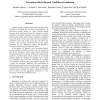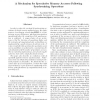29 search results - page 4 / 6 » Reducing misspeculation overhead for module-level speculativ... |
IEEEPACT
2009
IEEE
14 years 2 months ago
2009
IEEE
—CPR (Checkpoint Processing and Recovery) is a physical register management scheme that supports a larger instruction window and higher average IPC than conventional ROB-style re...
NSDI
2010
13 years 9 months ago
2010
Early web content was expressed statically, making it amenable to straightforward prefetching to reduce userperceived network delay. In contrast, today's rich web application...
HPCA
2004
IEEE
14 years 8 months ago
2004
IEEE
Pipeline gating has been proposed for reducing wasted speculative execution due to branch mispredictions. As processors become deeper or wider, pipeline gating becomes more import...
IPPS
2000
IEEE
14 years 8 hour ago
2000
IEEE
In order to reduce the overhead of synchronizing operations of shared memory multiprocessors, this paper proposes a mechanism, named specMEM, to execute memory accesses following ...
SPAA
2009
ACM
14 years 8 months ago
2009
ACM
Thread-level speculation (TLS) is a technique that allows parts of a sequential program to be executed in parallel. TLS ensures the parallel program's behaviour remains true ...


